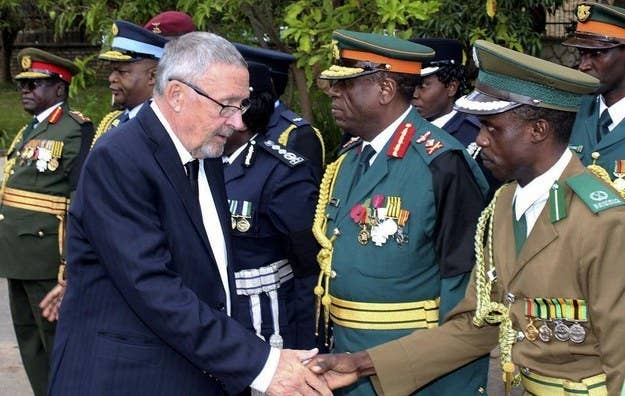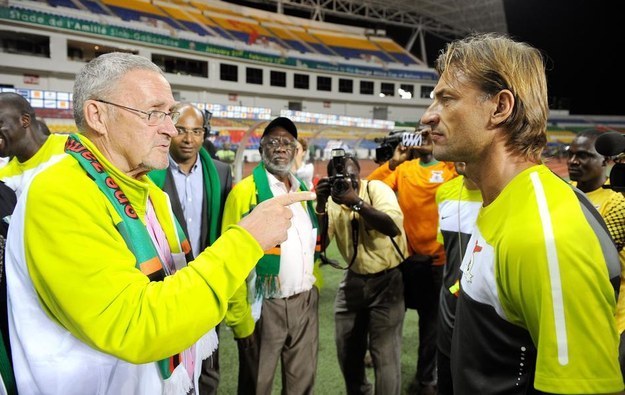Meet Guy Scott, seen here with President and First Lady Obama. As of today is the head of the southern African country of Zambia.
'I am Africa's first white democratic leader' - Guy Scott takes top job in Zambia http://t.co/wZZsZV6hLz (Pic: Rex)
Until the death of President Michael Sata on Tuesday in a London hospital, Scott was the vice-president of the country formerly known as Northern Rhodesia.
"I am the acting president at the moment. It has just been passed by cabinet," he said in an exclusive interview with The Telegraph. "This made him Africa's first white president of a democratic government ever 'except maybe the Venetians in the days when they ran the world,'" the British newspaper reported him as saying.
Scott is one of only 40,000 white citizens among Zambia's population of 13 million, a position that had the potential to be fraught with racial tensions. But Scott has been embraced by the country where he was born. "He is a black man in a white man's skin," said Nathan Phiri, a bus driver, to Reuters. "The very fact we accepted him as vice-president shows that we consider him as one of us."
At the time of his appointment as appointment to the vice-presidency in 2011, Scott was a former agriculture minister and member of parliament who had just won his home constituency by a landslide. Sata had just beaten the incumbent president, Rupiah Banda, the latter of whom accepted the results and stepped down to retire quietly. One professor at the University of Zambia told the BBC that he believes that Sata chose Scott as his deputy "in order to 'link' Zambia to foreign powers, and because he was a major funder of the Patriotic Front (PF) party, helping it to gain power for the first time in 2011 after Mr Sata spearheaded the modernisation of the party."
Scott soon thereafter called himself "the highest pure honky" official in sub-Saharan Africa.
"I have long suspected Zambia is moving from a post-colonial to a cosmopolitan condition," he said at the time. "People's minds are changing. They are no longer sitting back and dwelling on what was wrong about a colonialism. There's a Caribbeanisation, there's a range of colours – so what?"

As fitting a politician, the 70 year-old Acting President is both highly quotable and extremely opinionated.
In an interview with The Guardian last year, Scott made clear his opinion on such topics as Zimbabwean leader Robert Mugabe, how he really feels about South Africa, on his views of homosexuality, and on allegations that the administration he serves is oppressive.
On Mugabe: "I'm sure any good African nationalist admires Mugabe .... Racism in Zimbabwe is a serious issue. I was sent to school down there and it was like being in the Hitler Youth: the theories about black inferiority and this kind of stuff."
On South Africa: "The South Africans are very backward in terms of historical development ... I hate South Africans. That's not a fair thing to say because I like a lot of South Africans but they really think they're the bees' knees and actually they've been the cause of so much trouble in this part of the world.
I dislike South Africa for the same reason that Latin Americans dislike the United States, I think. It's just too big and too unsubtle."
On allegations of oppression: "I really am very hard-pressed to find a corner I can sit in and believe that we're looking at a one-party state again."
"It doesn't help that people don't know where Zambia is and they don't know what Zambia is like. If you were to write a story about America getting out of hand and going to a one-party state, everybody knows so much about the United States that they won't believe you.
"If you say, 'Somewhere over there in the African hinterland, not far from where Marlon Brando had a house surrounded by stakes with heads of his enemies on, not far from the Congo, there's a place where there's a one-party state …' Well, there probably is, probably several. And so it's a lot easier for that because there's no built-in balance."
On homosexuality in Zambia: "I think you've got so much cleaning up to do of killings and defilements and this and that, it's almost self-indulgent to think, 'Well, why don't we sit here and talk about gay rights?'"
"It's indulgent politics that assumes yes, we don't actually have 7 million unemployed people. Realistically, I think even an average gay, if you gave him a list of all the concerns Zambia had, would not necessarily put gay rights on top."
"There's tonnes of gay joints in this town. Well, not tonnes but they're there, well known. It's entirely the same phenonemon you get anywhere else. It's live and let live. Stirring up and making it worse, that is the biggest danger. Let sleeping dogs lie is an easier policy."

Scott will rule over the country for the next 90 days, when a by-election will be held to fill the vacancy left by Sata's death.
But the acting president won't be able to make the job permanent. Under the Zambian constitution, a person can only run for the highest office if "both his parents are Zambians by birth or descent," a qualification that Scott lacks. "I won't run for the presidency at the election because constitutionally, I can't," he told The Telegraph.
According to Reuters, that leaves "defense minister Edgar Lungu and finance minister Alexander Chikwanda the most likely contenders for the ruling Patriotic Front party's ticket."
